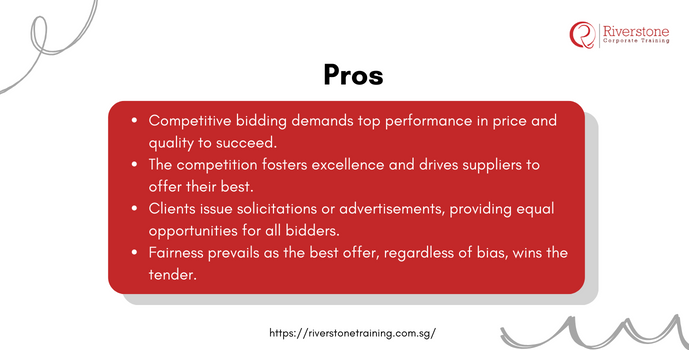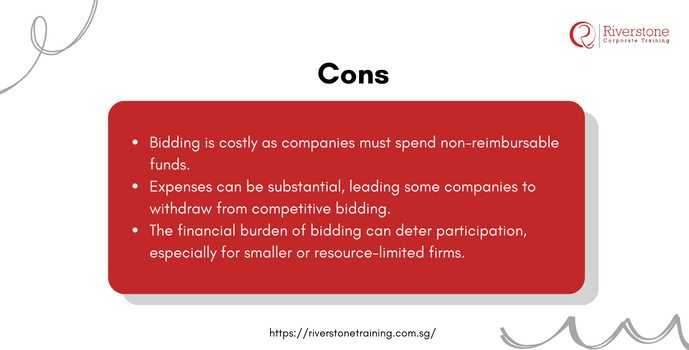
WHAT IS COMPETITIVE BIDDING?
Competitive bidding is a term that can be associated with opportunities and business proposals. In simple words, competitive bidding is a price quotation or business proposal which is submitted to a solicit firm or organization to get business. Mostly these proposals are submitted to take the opportunity to do business by providing certain products or services to request a firm or organization seeking to get some work done.
Competitive bidding brings some of the leading suppliers to one table to get business from the clients. The whole process of competitive bidding is carried out mostly in case of significant scale work for an estimated period.
UNDERSTANDING COMPETITIVE BIDDING:
Competitive bidding involves two or more companies trying to seek the opportunity of providing their products and services to another company or organization. In layman’s language a competition between the two companies to win business from one client.
When a company or the government needs some product or a particular service, they publish a solicitation in the form of a request for proposal (RFP). Then the companies come up with their best plans and compete with the others in terms of price, quality and completion time.
PROS AND CONS OF COMPETITIVE BIDDING:
Pros:
To win in competitive bidding, the companies or the suppliers will have to be at the top of their game. They need to make sure they are offering the best in terms of price and quality. One of the most significant advantages of competitives bidding is the competition itself. Due to this competition, the suppliers push themselves to provide the best. Also, it encourages the value of money and quality.
In these competitives biddings, the client, which can be any individual, company or government, publishes a solicit or advertisement. Because of this advertisement and solicit, the companies get a fair chance to participate in the bidding. Moreover, there is no bias. The best offer wins the tender.
Cons:
The bidding process is expensive. To place a bid, the companies need to spend a certain amount of money, which is not reimbursable. Sometimes it can be a considerable amount. So, there are instances where companies step back from competitives bidding.
EXAMPLES OF COMPETITIVE BIDDING:
Competitive bidding is not rare. There are many real-world examples. One of the examples is government projects. If the government is willing to make some work done, then it launches a solicit. Now the suppliers and companies working in that particular field of work bid on the project. They are required to fill some bidding documents and deposit the mentioned bidding amount. On a specific day, the government announces the winner and handovers the project to that company.
Navigating Singapore’s Competitive Bidding Landscape:
Prepare an authoritative business guide targeted only at Singapore-based businesses wishing to publicly participate in competitive bidding, especially those on government tenders (e.g. GeBIZ) and massive projects in the private sector. This material must include the description of common phases of the bidding process in Singapore, including how to find the opportunities, how to get to know about tender documents, how to create attractive proposals, and how to comply with the local rules. Share information about pitfalls, excellent practices of SMEs, and effective pricing of the bid to win a deal, and at the same time remain profitable in the Singaporean market. This content could be especially beneficial when paired with practical finance training for small businesses, helping firms manage budgeting, cash flow, and risk as they scale up for bidding on larger contracts.
Bidding Strategies on Winning Tenders and Auctions in Singapore’s Economy:
Craft material that will not be basic, but instead, it should be able to discuss in greater detail advanced techniques in competitive bidding, which can be applied in most circumstances in Singapore. This might be the advice to maximize the opportunities in the public procurement, the strategies to apply in various kinds of auctions (e.g. to buy government bonds, or the assets of a particular industry), and the ability to use the data sources and intelligence of the market to develop winning bids. Talk about how to do competitor analysis, buyer behaviour and changing the bidding strategies depending on the market and the particular industry in Singapore and give them practical advice on how a finance people or the business development team can utilise these ideas. Enrolling in a strategic finance management course can provide the necessary decision-making skills and real-world tools needed to approach these complex scenarios. Additionally, applying the top tools for business financial analysis will enable bidders to uncover insights and optimize their strategies with precision.
Competitive Bid Policy in Singapore
A competitive policy of bidding lays out the formal procedures of forcing an organization to invite several bids of vendors of good or services. The essence of it is to define transparency, fairness and accountability in procurement, realizing the best value. These policies normally indicate the conditions when it is mandatory to bid, nature of bid solicitation (e.g. using RFPs, RFQ) and the purpose of evaluation criteria. Such essential items are clear specifications, submission dates, qualification of bidders and a clear procedure of opening of tenders and awarding of contracts. The structure will discourage collusion and overpricing serving as a source of market competition. This is essential in the governance of the public and the private sector in Singapore, promoting good and economical use of resources, especially when sourcing high-quality services such as professional e-learning content design Singapore businesses increasingly rely on.
CONCLUSION:
Competitive bidding is a procedure that ensures the value of money and quality. The competition amongst the bidders encourages them to do their best. Also, competitives bidding is the stepping stone of an excellent quality work project. competitive bid policy



